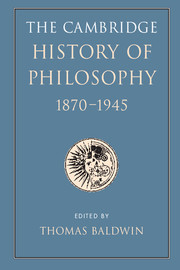Book contents
- Frontmatter
- Contents
- List of contributors
- Introduction
- I 1870–1914
- II 1914–1945
- 8 Logic and philosophy: the analytic programme
- 28 Logical atomism
- 29 The scientific world conception: logical positivism
- 30 The achievements of the Polish school of logic
- 31 Logic and philosophical analysis
- 9 The diversity of philosophy
- 10 Knowledge, language, and the end of metaphysics
- 11 Philosophy and the exact sciences
- 12 Mind and its place in nature
- 13 Philosophy and social science
- 14 Ethics, religion, and the arts
- 15 Law and politics
- Biobibliographical appendix
- Bibliography
- INDEX
- References
28 - Logical atomism
from 8 - Logic and philosophy: the analytic programme
Published online by Cambridge University Press: 28 March 2008
- Frontmatter
- Contents
- List of contributors
- Introduction
- I 1870–1914
- II 1914–1945
- 8 Logic and philosophy: the analytic programme
- 28 Logical atomism
- 29 The scientific world conception: logical positivism
- 30 The achievements of the Polish school of logic
- 31 Logic and philosophical analysis
- 9 The diversity of philosophy
- 10 Knowledge, language, and the end of metaphysics
- 11 Philosophy and the exact sciences
- 12 Mind and its place in nature
- 13 Philosophy and social science
- 14 Ethics, religion, and the arts
- 15 Law and politics
- Biobibliographical appendix
- Bibliography
- INDEX
- References
Summary
Logical atomism is a complex doctrine comprising logical, linguistic, ontological, and epistemological elements, associated with Russell and Wittgenstein early in the twentieth century. The first appearance of a form of logical atomism (though not explicitly identified as such) is in Russell’s philosophical introduction to Principia Mathematica (1910a; see esp. 43–5). Russell had acquired elements of this position from his earlier studies of Leibniz (who is a clear precursor of logical atomism), from his reaction against absolute idealism (where the influence of G. E. Moore’s early atomism, as in Moore 1899, was important), and from his analysis of knowledge. A year later Russell used the term ‘logical atomism’ for the first time (though in French) in his lecture ‘Le réalisme analytique’, where he says of his analytic realism ‘this philosophy is the philosophy of logical atomism’ (1911 [1984– : VI, 135]).
Russell’s conception of logical atomism developed further in the course of his discussions and correspondence with Wittgenstein during the period from 1912 to 1914. These were primarily concerned with the foundations of logic, but the lessons learnt there were applied by Russell and Wittgenstein to other areas. The term ‘logical atomism’ then became known in English through Russell’s 1918 lectures ‘The Philosophy of Logical Atomism’ which provide the fullest presentation of his position (1918 [1984– : VIII]). Though Russell there describes his views as ‘very largely concerned with explaining ideas which I learnt from my friend and former pupil Ludwig Wittgenstein’ (1918 [1984– : VIII, 160]), there are significant differences between their versions of logical atomism. Wittgenstein’s logical atomism is set out in his Tractatus Logico-Philosophicus (1921).
- Type
- Chapter
- Information
- The Cambridge History of Philosophy 1870–1945 , pp. 379 - 390Publisher: Cambridge University PressPrint publication year: 2003



